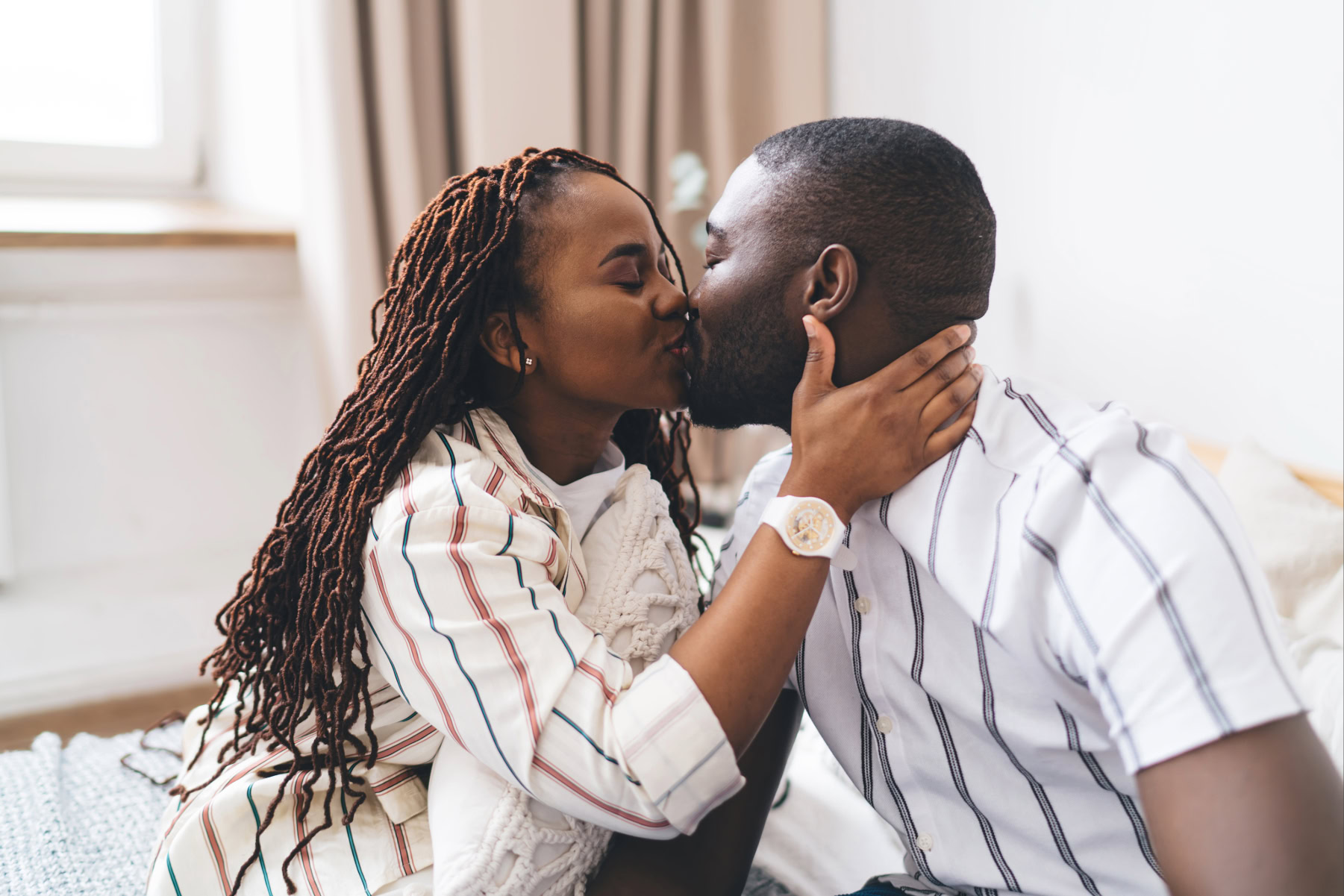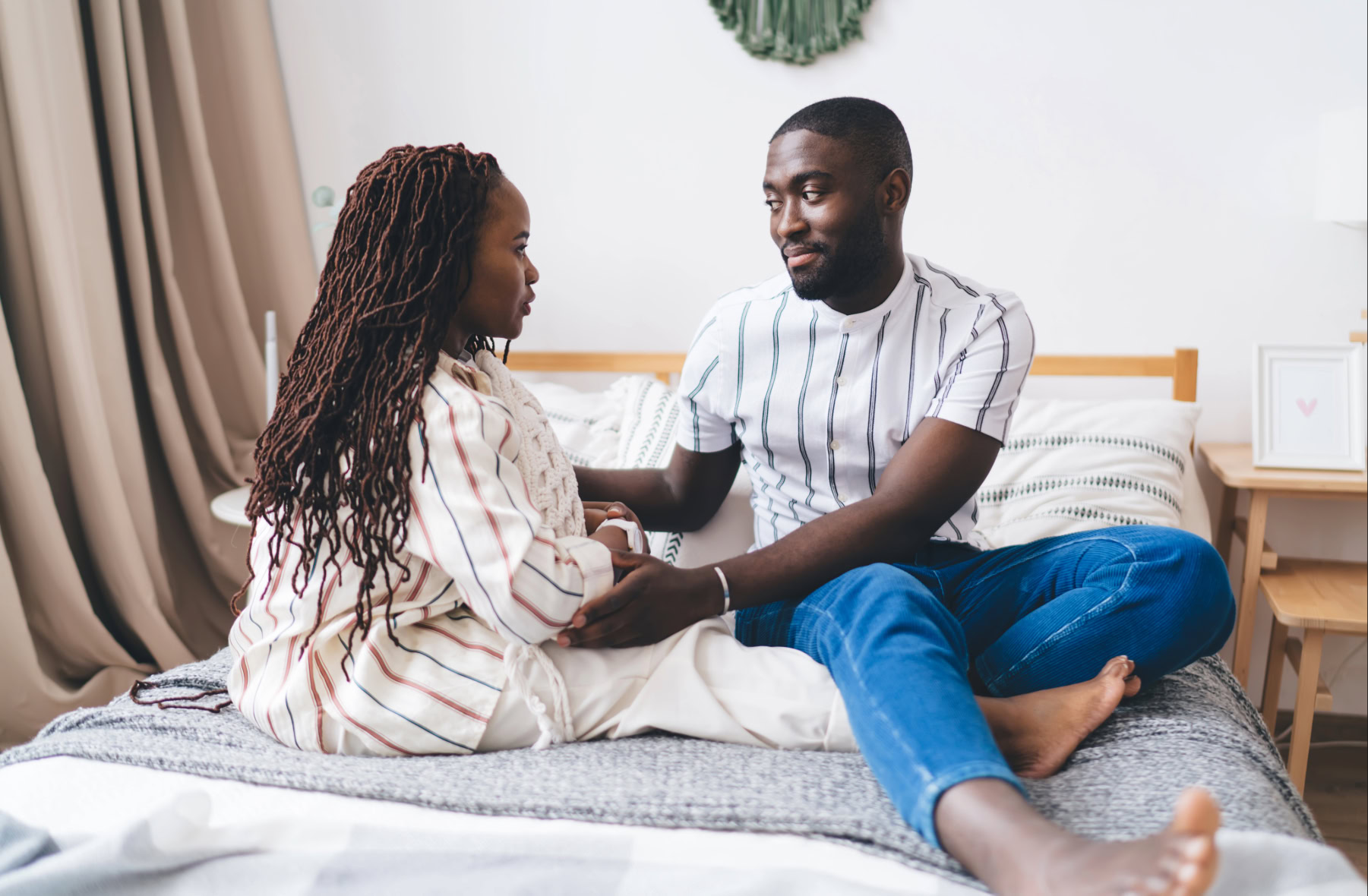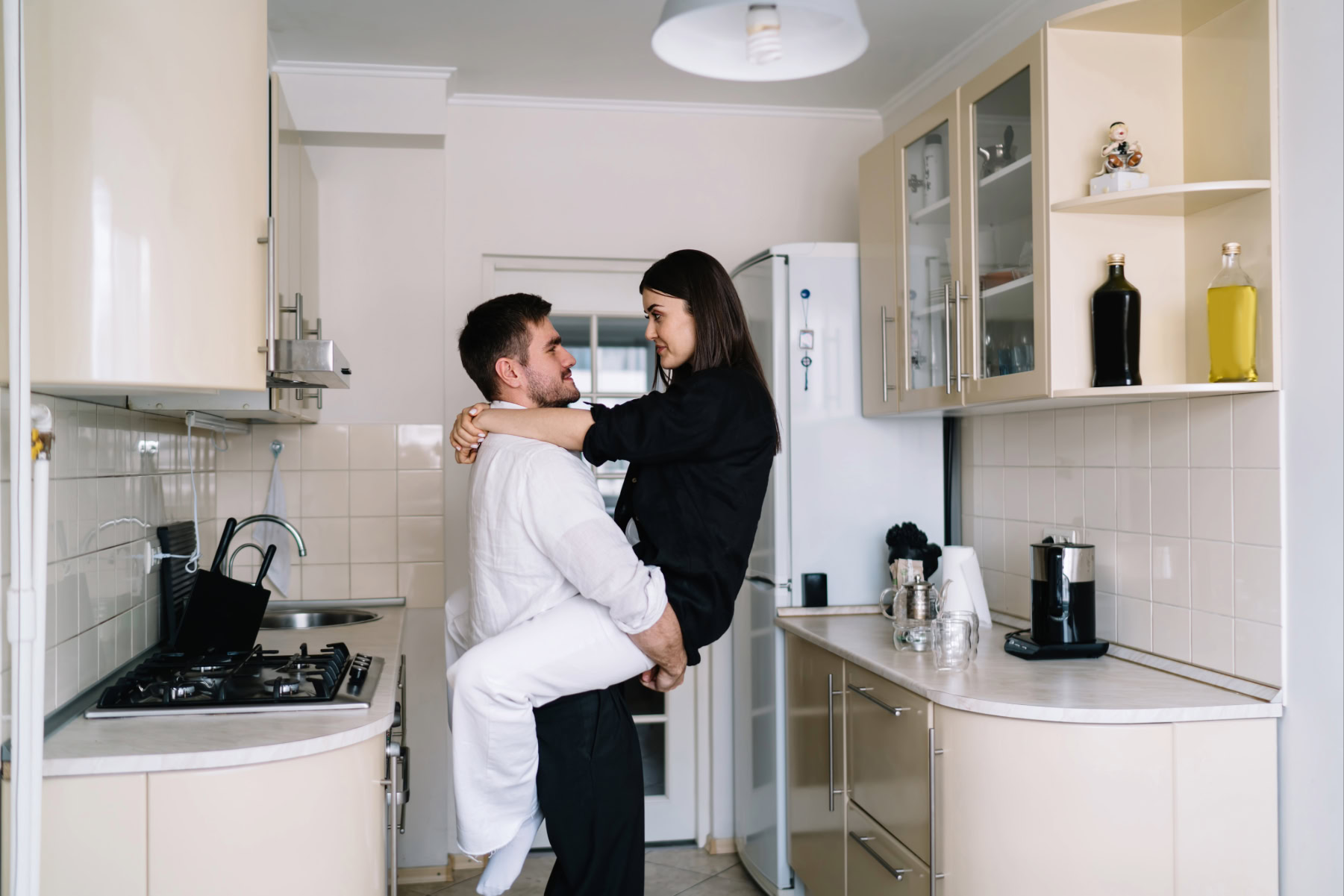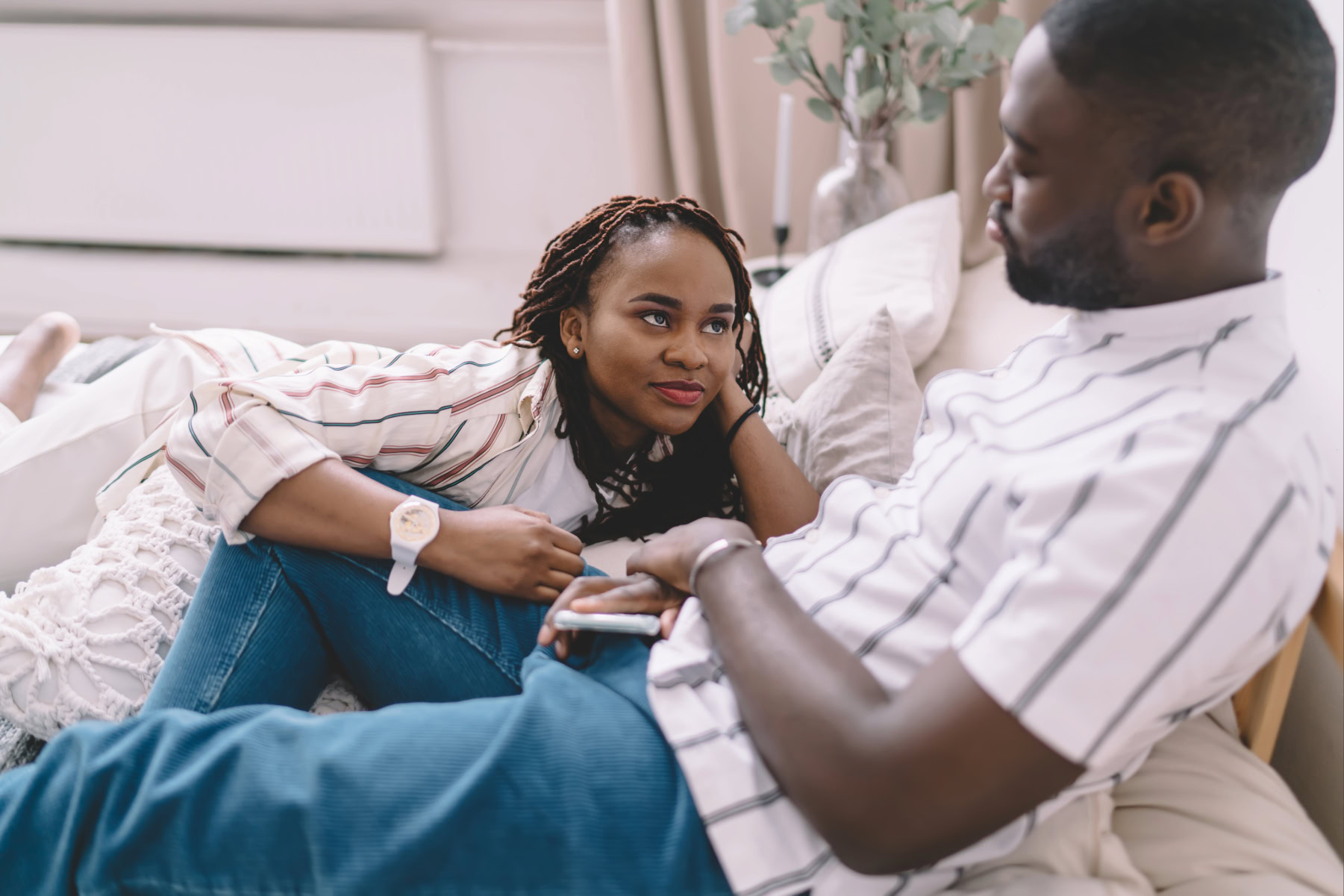- Nov 17, 2025
50 Science-Backed Reasons Why You Might Feel Anxious In a Relationship
Feeling anxious in a relationship is surprisingly common. And there's more causes than you may expect. To demonstrate this, we've pulled together 50 science-backed reasons why you might feel anxious in a relationship, to help you get to the root cause of your own.
50 Science-Backed Reasons Why You Might Feel Anxious In a Relationship
So let's get stuck in, shall we? Have a read of this list and make a note of anything that you think rings true for you, or which could certainly be the case. Read through it twice if you need.
We also have this FREE Relationship Anxiety Quiz, to help you quickly but accurately determine how bad (or "normal") your relationship anxiety is.
Once you know the root cause for why you're feeling anxious in a relationship, you can better tackle it.
Common causes for feeling anxious in a relationship, typically include...
1) Anxious Attachment Style
Anxious attachment style typically originates from inconsistent caregiver responses in childhood, leading individuals to constantly seek reassurance while feeling insecure in relationships.
This early pattern manifests in adulthood as a deep fear of abandonment, heightened sensitivity to a partner's availability, and hypervigilance, ultimately causing overwhelming relationship anxiety.
What you do, however, need to be aware of is that 45% of the variability in anxious attachment styles may be linked to genetic causes. There are also other factors that come into play which means - you can form an anxious attachment style, even if you didn't have a difficult childhood.
For this reason, it's well worth learning more about and digging deeper into. Likewise...
2) Avoidant Attachment Style
An avoidant attachment style is characterized by a deep discomfort with intimacy, stemming from a fear of losing independence or being overwhelmed in relationships.
This leads to a paradoxical desire for connection alongside an anxious resistance to emotional closeness, creating a constant push-pull dynamic.

3) Past Trauma
Past trauma, often stemming from abuse, profoundly damages an individual's fundamental sense of safety and ability to trust in intimate relationships, as you can imagine.
This experience can rewire the brain's threat detection systems, leading to hyperarousal and fear responses that are easily triggered in vulnerable situations. Consequently, survivors often struggle to feel secure or open up emotionally with partners, turning romantic connections into a source of anxiety rather than comfort.
This was actually the main source of my relationship anxiety - if you'd like to read my personal story here. I share this so that you know, I truly do get it. And you really are not alone.
4) Fear of Rejection
Fear of rejection is undoubtedly another cause for feeling anxious in a relationship. It's also more complex than you may think, because - believe it or not - but we're wired to fear it.
Uh huh, fear of rejection in romantic relationships stems from an evolutionary survival instinct, as social exclusion historically threatened our ancestors' existence. This deep-seated fear makes vulnerability NATURALLY feel existentially risky, triggering intense emotional pain in the brain.
So yes - your fears are more deep-rooted than you may think. It's natural, it's normal, but thankfully you can also still fight it.
5) Fear of Abandonment
What other fears often drive you to feel anxious in a relationship? Well, fear of abandonment of course.
As you're probably already starting to see - there's likely to be cross-overs and multiple sources that are driving your relationship anxiety. But that's okay - just keep making a note of any that apply to you.
Anyone can develop a fear of abandonment. Again, it can be deeply rooted in a traumatic experience you had as a child or a distressing relationship in adulthood.
This deep-seated anxiety can make every disagreement feel catastrophic, turning the source of comfort into a constant trigger for distress and driving behaviors such as clinginess or avoidance in relationships.
6) Low Self-Esteem
Low self-esteem is another science-backed cause of relationship anxiety and it's incredibly damaging. This is one of the reasons why we home in specifically on helping women overcome low self esteem in relationships.
You see, low self-esteem operates like a lens that distorts reality. When you fundamentally doubt your lovability, you interpret neutral or even positive partner behaviours through this negative filter.
A delayed text becomes evidence of waning interest. A moment of distraction becomes rejection. This cognitive bias, known as negative self-schema, fuels relentless anxiety and can paradoxically push partners away through constant need for validation.

7) Negative Past Relationship Experiences
You don't have to go through trauma to experience relationship anxiety as a result.
Negative past relationship experiences, such as betrayal or neglect, create lasting psychological imprints that cause your brain to constantly anticipate similar threats.
This leads to hypervigilance and anxiety in current relationships, as you scrutinize your partner's actions, often undermining present happiness in an attempt to protect yourself from re-experiencing old pain.
8) Overthinking and Rumination Traps
Overthinking and rumination trap individuals in endless loops of worry, where every interaction is dissected for hidden meanings, and minor uncertainties are amplified into major catastrophes.
This constant mental analysis not only fuels anxiety (and depression as a matter of fact) but also elevates stress hormones, keeping the body in a perpetual state of heightened alert and making it difficult to regulate emotions or solve problems effectively within the relationship.
So whatever the fundamental source of cause, if you're struggling with overthinking - it's absolutely also going to keep you stuck feeling anxious in your relationship too.
9) Habitual Need for Reassurance
The constant need for reassurance is one of the signs of relationship anxiety, but it's worth mentioning in here as well, as one of the causes that keeps you feeling anxious in a relationship too.
Often driven by a fear of negative evaluation, the constant need for reassurance becomes a self-defeating cycle in relationship anxiety. While it offers temporary relief, it paradoxically increases anxiety over time as each validation provides diminishing returns.
This behavior, stemming from underlying insecurity, can exhaust partners and strain the relationship, ultimately reinforcing the very anxiety it aims to alleviate.
10) Jealousy and Distrust
Similarly, jealousy and distrust, also tend to stem from deep-seated insecurities or past betrayals too. This also create a painful cycle that undermines relationships.
The intense emotional response caused by jealousy or a lack of trust can quickly escalate from minor worries into panic, and further erode the very trust and intimacy essential for a healthy partnership.
This again, ultimately fuels greater anxiety in a self-fulfilling prophecy.

11) Fear of Losing Independence
For some, deep intimacy feels like a threat to their personal freedom and sense of self, leading to anxiety as they struggle to reconcile the desire for connection with the need to maintain their independence.
We've got to mention the more avoidant causes that create anxiety in a relationship too.
12) Communication Problems
No matter your attachment style or personal challenges in a relationship, when open and honest communication is absent, this in itself creates a vacuum that anxiety rushes to fill with speculation, misunderstandings, and worst-case scenarios.
This, in turn, can lead to a constant state of uncertainty about a partner's true feelings, intentions, and commitment, thereby increasing emotional distance and feelings of anxiety around what will happen next.
13) Incompatible Values or Goals
When partners discover they have fundamentally different values on crucial life decisions, such as family, location, or career, it creates deep-seated tension and doubt about the relationship's long-term compatibility.
This misalignment generates anxiety by highlighting that love alone might not overcome such important divides, making future planning feel less exciting and more like a source of chronic worry about investing in an ultimately unviable future.
This is a genuinely legit and situational relationship anxiety, that requires clear and honest assessment, as opposed to homing in on the relationship anxiety itself. Essentially - it's not something you can just brush off. Your anxiety is valid and an indication that you do need to dig deeper into this.
14) Unresolved Conflict
Similarly, when conflicts in a relationship are consistently left unaddressed, they accumulate like emotional debt, creating emotional distance, fostering chronic stress, and leading to persistent anxiety about the relationship's future and its potential breakdown.
Your anxiety is your body's way of saying, "hold up, something isn't right here." It doesn't mean you have to split up, but it does mean it's important to take time to work through it properly, together, as a team.

15) Partner's Emotional Baggage
Not all sources of relationship anxiety are on you. Your partner's unresolved emotional issues, such as past traumas or anxiety, can inadvertently transfer to you, creating your own feelings of anxiety and insecurity within the relationship, even if the issues aren't directly yours. This is important to be aware of, for sure.
16) Substance Use
Your partner's substance use is something that would likely create profound relationship anxiety. It introduces unpredictability, undermining trust, and increasing the risk of conflict and emotional neglect.
Substance use often forces the other partner into a state of constant vigilance, walking on eggshells due to impaired judgment and unstable behavior.
So if it's something that you or your partner struggle with, it's important to address.
17) Social Comparison
Next up, we've got to mention social comparison - particularly if it's that which is fueled by curated online portrayals of 'perfect' relationships - as this is another common source of anxiety in a relationship.
Social comparison is an innate human drive, first formally described by psychologist Leon Festinger in 1954. From an evolutionary perspective, comparing oneself to others was vital for survival within a social group, helping individuals assess their abilities and social standing relative to potential threats and resources. So it makes sense why we all do it.
However, constantly measuring your own reality against others' highlight reels leads to unrealistic expectations, feelings of inadequacy, and unnecessary questioning of your relationship's health and happiness, fostering dissatisfaction and worry, so balance is essential.
18) Fear of Intimacy
Fear of intimacy is another reason why you might be feeling anxious in a relationship.
It stems from the deep apprehension of emotional vulnerability. The act of opening up to someone, and letting them truly know you - flaws and all - can feel like a significant risk, triggering intense discomfort and anxiety.
The problem is - this protective mechanism, designed to prevent potential emotional pain or rejection, often leads to guardedness and avoidance behaviors, paradoxically hindering the authentic connection and intimacy we crave.
Without that level of connection and intimacy, anxiety and doubt rises, so it's another difficult trap to escape.

19) Self-Silencing
Self-silencing occurs when individuals consistently suppress their true thoughts, needs, and feelings to maintain harmony or avoid conflict in a relationship.
This act of sacrificing authenticity for perceived security creates growing internal tension, decreases relationship satisfaction, and fosters profound anxiety about whether one is truly loved for who they are, ultimately undermining genuine connection.
20) Partner Accommodation of Anxiety
When one partner constantly modifies their behavior to soothe the other's anxiety, such as providing endless reassurance or avoiding perceived triggers, it inadvertently reinforces the anxious patterns and prevents the anxious partner from developing their own coping mechanisms.
This cycle creates dependency and imbalance in the relationship, leading to increased strain and heightened anxiety for both individuals rather than true resolution.
Your partner may think they are helping you, but - the sad truth is - science proves they're only sustaining the anxious cycles. That's why it's so important to work together and have effective, but balanced tools to ease anxiety when you need to, without being overly reliant on your partner to do it for you.
21) Chronic Stress Outside Relationship
Chronic stress from external factors like work, finances, or health issues can overwhelm your system, causing a "spillover" effect into your relationship.
This heightened state of stress reduces patience, magnifies small irritations, and intensifies relationship anxiety, often making it seem like the relationship is the problem when it's actually your body's overwhelmed response to outside pressures.
You feel like everything is just too much, when - with calm reflection - you might be able to see, there's no problem with the relationship itself after all.
22) Fear of Being Unlovable
This one's another especially tough one. After all, the fear of being unlovable often stems from early childhood experiences, embedding a deep-seated belief that one is inherently defective or unworthy of affection.
This core insecurity creates chronic anxiety within relationships, leading to hypervigilance for signs of rejection and a tendency to interpret a partner's actions through a lens of inadequacy.
Ultimately, it's a pervasive fear that can unconsciously drive self-sabotaging behaviors, inadvertently pushing partners away and reinforcing the very belief of being unlovable.
It can also be surprisingly difficult to recognise, so it's one to watch out for, for sure.

23) Perfectionism
Perfectionism is another hidden reason why you might be feeling anxious in a relationship. It's something that doesn't always immediately spring to mind when you're considering the cause. But it fuels relationship anxiety by setting impossibly high standards for oneself, one's partner, and the relationship itself.
This leads to constant pressure, fear of failure, and distress when the inevitable messiness of real human connection falls short of these unrealistic ideals, ultimately creating ongoing anxiety about the relationship's perceived imperfections.
24) Lack of Trust
Lack of trust, particularly if it has stemmed from a partner's past infidelity, lies, or broken promises, fundamentally ruptures the relationship's foundation - as you can imagine.
This deficit activates the brain's threat detection systems, leading to persistent suspicion, jealousy, and constant surveillance.
Such a neurobiological response generates intense anxiety, making trust extraordinarily difficult to rebuild and requiring consistent, transparent behavior over extended periods to retrain the brain's threat assessment.
(It sounds a little complex and daunting, but anything can be made easier and doable once broken down.)
25) Fear of Change or Uncertainty
Relationships are inherently unpredictable, with partners and circumstances constantly evolving. And so, for individuals with an intolerance for uncertainty, this natural unpredictability becomes a major source of anxiety, as they desperately seek guarantees about the future that no relationship can provide, leading to mental distress and attempts to control the uncontrollable. Tricky, indeed!
26) Attachment Injuries
We've made it to the half-way mark so let's throw in some attachment injuries... Attachment, what?! Yes, you read right!
Attachment injuries arise from profoundly painful experiences where a partner fails to provide essential support during a vulnerable moment, leaving a deep emotional wound that makes one question the safety and reliability of the relationship.
This betrayal of trust creates lasting anxiety about a partner's dependability, triggering defensive responses in similar situations until the injury is explicitly acknowledged, processed, and healed.
It's a term you may not have initially been familiar with, but which is likely to actually relate to you, to some degree.

27) Emotional Dysregulation
Throwing another term in for you now - emotional dysregulation refers to difficulty managing the intensity and duration of emotions, causing minor relationship frustrations to escalate into overwhelming crises.
This often stems from past experiences like trauma, leading to emotional volatility where the nervous system overreacts with anxiety, anger, or despair, creating significant worry about one's own reactions and their impact on the relationship.
28) Social Anxiety Disorder
Social anxiety disorder transforms relationships into a constant performance where you fear judgment, leading to intense worry about your partner's perception and often causing you to avoid vulnerability. This disorder, as you can imagine, makes every interaction feel like a social threat, significantly intensifying baseline relationship anxiety. There's always a knock-on effect.
29) Generalised Anxiety Disorder (GAD)
Likewise, Generalised Anxiety Disorder (GAD) transforms relationships into a constant cycle of excessive, uncontrollable worry, where everyday uncertainties are amplified into catastrophic concerns. The GAD brain struggles to differentiate between minor relationship stressors and genuine threats, leading to a perpetually heightened state of anxiety that profoundly alters how one experiences intimacy and connection.
30) Depression
Then of course, there's depression. This often causes intense relationship anxiety by eroding self-worth, leading to persistent sadness, withdrawal from partners, and difficulty communicating needs and feelings.
The depressed mind, filled with thoughts like 'You're a burden' or 'They'd be better off without you,' fosters an excessive need for reassurance and fears of abandonment, thereby reducing one's capacity to manage relationship challenges effectively. It's something that shouldn't be overlooked.
31. Fear of Conflict
Fear of conflict, often rooted in past negative experiences, leads to avoiding disagreements to protect the relationship. Ironically, this avoidance prevents genuine resolution, allows problems to fester, and ultimately undermines intimacy, leading to increased relationship anxiety.

32) Over-Dependence on Partner
What else have we got? Well, an over-dependence on your partner.
Over-dependence on a partner means making them your primary or only source of emotional stability, self-worth, and happiness. This creates immense pressure on the relationship, leading to an intense fear of abandonment and hindering the development of personal coping skills.
The result is chronic anxiety about the partner's availability and the relationship's stability, alongside a fragile sense of self that struggles without constant external validation.
When you make someone your entire world - you're bound to feel worried about losing them right? It doesn't mean you have to love them any less, but - again - balance is required.
33) Lack of Boundaries
Then of course, there's a lack of boundaries, which become another key source of feeling anxious in a relationship.
Why? Well because, a lack of clear personal boundaries in a relationship causes individual identities to blur, leading to discomfort, resentment, and a persistent fear of being overwhelmed or losing oneself.
This absence of essential emotional and personal limits creates significant anxiety for both partners, as personal space feels invaded and individual needs become indistinguishable, ultimately undermining relational stability and individual well-being.
34) Emotional Unavailability
Childhood emotional neglect, does not always cause emotional attachment; rather, it often leads to insecure or avoidant attachment styles and difficulties forming healthy relationships later in life
Often marked by caregivers who are physically present but emotionally absent, it teaches individuals that their emotional needs are unimportant and that others cannot be fully relied upon.
This early relational trauma profoundly impairs the ability to trust and form secure attachments, leading to persistent relationship anxiety and a constant fear of a partner's emotional unavailability.
35) Unmet Emotional Needs
Similarly, when fundamental emotional needs like feeling heard, supported, or validated are consistently unfulfilled in a relationship, it generates deep anxiety, signaling that something is fundamentally amiss and leading to profound insecurity about one's value and the relationship's future.
If this was formed from past relationship, it's unresolved baggage that needs to be worked through. If it was formed and continues to be present in a current relationship - it's an indication that something isn't quite right, and so you have to address it head on, alongside the relationship anxiety itself.

36) Fear of Being Controlled or Manipulated
Another fear that can stir up anxious feelings in a relationship is the fear of being controlled or manipulated.
Past experiences with controlling or manipulative partners can leave an unsurprising lasting imprint, causing a deep-seated fear of losing personal autonomy and freedom in new relationships.
This heightened sensitivity can lead to hypervigilance and defensive behaviors, making it difficult to trust intimacy and distinguish between healthy interdependence and actual control, thus fueling relationship anxiety, unique to these specific fears.
37) Physical Health Issues
We can't forget how physical health also comes into play! Chronic physical health issues, including persistent pain or illness, deeply impact emotional well-being and relationship dynamics by increasing stress, affecting intimacy, and fostering anxieties about one's worth and future capacity within the relationship.
38) Hormonal or Neurochemical Imbalances
We wrote about this in depth in another post: The Self Love Cycle All Women Experience (Yet We Don't Talk About Enough!) - it's well worth giving a quick read.
In essence, fluctuations in brain chemistry, including neurotransmitters like serotonin and hormones such as cortisol and sex hormones, can directly impact anxiety levels and contribute to feelings of relationship insecurity.
Conditions like PMS, menopause, or thyroid disorders can also create neurochemical imbalances that heighten anxiety sensitivity, indicating that biological factors may, too, be an underlying cause.
39) Fear of Being Judged
From the complex, to the fundamental... Fear of a partner's judgment can lead to constant self-monitoring and a reluctance to show your authentic self, resulting in a relationship where you are performing rather than truly connecting. This exhausting vigilance, often rooted in past experiences, prevents genuine intimacy and paradoxically creates the very emotional distance you dread.

40) Uncertainty About Relationship Status
As you can imagine, uncertainty about a relationship's status, whether it's exclusive or casual, creates a breeding ground for anxiety. This is one of the most common reasons for feeling anxious in a relationship that's still in the early stages.
When expectations and intentions are left unstated, the mind tends to fill these gaps with worst-case scenarios, leading to constant worry and insecurity about the future of the connection.
Clear and honest communication between partners is essential to define the relationship, reducing this ambiguity and replacing anxious unknowns with shared understanding and peace of mind.
41) Past Experiences of Abandonment in Friendships or Family
It's also important to mention that you don't have to have a "full on" fear of abandonment in order to have abandonment issues that come into play, causing anxiety in a relationship.
Past experiences of abandonment - to whatever degree - whether from family or friends, deeply shape our expectations for future relationships.
These non-romantic losses teach the brain that abandonment is inevitable, fostering a generalized fear that leads to hypervigilance for signs of rejection, heightened anxiety about a partner's commitment, and significant difficulty in trusting that anyone will truly stay.
42) Fear of Intimacy Due to Vulnerability
Another thing I also want to home in on is vulnerability. After all, at its core vulnerability—authentic emotional exposure—is both the pathway to intimacy and the source of significant anxiety.
When you've been hurt by previous vulnerability, your nervous system learns to associate opening up with danger, creating an approach-avoidance conflict where you desperately want intimacy but are terrified of the vulnerability it requires.
This impossible position, needing what you fear, is the root of feeling anxious in a relationship.
43) Cognitive Distortions
Of course I couldn't complete this list without mentioning cognitive distortions - it's at the heart of all our work because it's so incredibly common. It's also why I incorporate CBT into my coaching programmes. (It's the winning combo, I truly feel!)
Cognitive distortions are unhelpful thinking patterns that twist reality, leading individuals to misinterpret relationship events negatively. As a result, they create unnecessary anxiety, insecurity, and often fuel self-fulfilling prophecies. (The nasty little things!)

44) Self-Sabotaging Behaviours
Self-sabotaging behaviours arise from unconscious fears, often rooted in beliefs of unworthiness or fear of intimacy, leading individuals to unintentionally create the very outcomes they dread in relationships.
This results in actions that undermine connection, such as picking fights or withdrawing, thereby trapping them in a cycle where anxiety fuels self-destructive patterns, pushing partners away and reinforcing their deepest insecurities.
45) Partner's Inconsistent Behaviour
I'm all for taking responsibility and controlling the things you can control, but a partner's inconsistent behavior, shifting unpredictably between warmth and distance, will absolutely create deep confusion and anxiety. This lack of reliable patterns keeps the brain in a constant state of alert, as it struggles to predict reactions, leading to heightened insecurity and a perpetual sense of unease within the relationship.
46) Social Isolation
Social isolation, where a romantic relationship becomes the sole source of support and connection, significantly heightens relationship anxiety. This intense reliance places unsustainable pressure on the partner and creates existential fear, as the loss of the relationship would mean losing an entire social world and support system, rather than just one connection.
47) Fear of Being Hurt Again
A common reason why you might be feeling anxious in a relationship, ultimately goes back to this common fear of being hurt again.
Past painful experiences often lead to anticipatory anxiety, making individuals hypervigilant, distrustful, and emotionally guarded in new relationships.
This protective mechanism, though once helpful, can become overgeneralized, treating all new connections as potential threats and thereby preventing healthy intimacy and fostering relationship anxiety.
48) Cultural or Familial Pressure
Oh and then there's this old chestnut! External expectations from family or culture, whether about relationship timelines, roles, or values, can create significant anxiety in a relationship, by clashing with personal desires or a healthy relationship timeline.
One of the hardest times is reaching 30 and all the pressures and expectations that come with settling down by then. It's tough, there's no denying it. And we feel you, girl.

49) Lack of Relationship Experience
A lack of relationship experience often leads to anxiety because individuals don't have established reference points for what is 'normal' or expected in romantic interactions.
This uncertainty can make every situation feel new and potentially threatening, fostering worries about making mistakes, understanding relationship norms, and knowing how to navigate common challenges effectively. It's worse the older you get, as then comes the "shame" around it too.
50) Biological Stress Response Activation
Last but not least, it's helpful to know that relationship anxiety often triggers a powerful biological stress response, activating the sympathetic nervous system and releasing hormones like cortisol and adrenaline, leading to physical symptoms such as increased heart rate, sweating, and rapid breathing.
These intense physical sensations, in turn, can reinforce psychological distress, creating a feedback loop where the body's reaction amplifies the mind's anxiety, perpetuating the cycle.
Phew... It sounds like a lot, I know. You don't need to understand HOW it works, exactly, if you don't want to dig into it that deeply. Just know that - like all the other factors - it really does play its part in why you might feel anxious in a relationship.
And Rounds It Up
So there we have it, our 50 science-backed reasons why you might feel anxious in a relationship.
It's a lot to take in, I know. So re-read it again if you need. In essence, relationship anxiety is complex, rooted in personal history, biology, attachment patterns, and relational dynamics. It's also no surprise that feeling anxious in a relationship is more common than you might think.
The next step is to establish to what degree you're struggling with it, and how to effectively work through it from here. Thankfully, we can help with that part...
Get Started With Our FREE 30 Day Guided Relationship Anxiety Ebook
If you've reached the end of this, don't stop now. I want to encourage you to check out our FREE 30 Day Guided Relationship Anxiety Ebook.
There's no cost, no risk, nothing to lose at all. But day by day, step by step, within one month, you will learn some fundamental tools you need to work through your relationship anxiety confidently.
At the very least - it's worth taking a look at right? We know you're going to find it valuable!
Remember - no matter how difficult your relationship anxiety is, and how many things feed into it, it DOESN'T have to rule your life or relationship(s) anymore.
Be brave. Take action. And believe in yourself. Because this IS something you can - and will - overcome, I promise you this.
Sending all our very best wishes.
Your Self Love Story